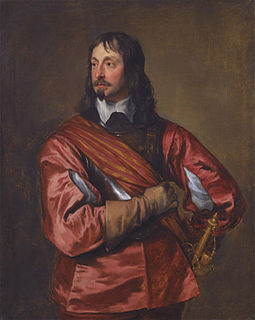Related Research Articles
Francis Davies was a Welsh clergyman who was Bishop of Llandaff from 1667 until his death.

George Hall was an English bishop.
Nathaniel Hardy (1618–1670) was an English churchman, Dean of Rochester from 1660.
Timothy Halton D.D. (1632?–1704) was an English churchman and academic, Provost of Queen's College, Oxford, from 1677.

Sir John Northcote, 1st Baronet was an English politician who sat in the House of Commons at various times between 1640 and 1676. He supported the Parliamentarian cause in the English Civil War.
William Tooker was an English churchman and theological writer, who was archdeacon of Barnstaple and later dean of Lichfield.

Vice Admiral Sir John Mennes was an English naval officer, who went on to be Comptroller of the Navy. He was also considered a wit. His comic and satirical verses, written in correspondence with James Smith, were published in 1656. He figures prominently in the Diary of Samuel Pepys, who reported directly to Mennes at the Navy Office and thought him an incompetent civil servant, but a delightful social companion.
Nicholas Dennys was an English politician who sat in the House of Commons from 1660 to 1678.

William Helyar of Coker Court, East Coker, in Somerset, was Archdeacon of Barnstaple and a chaplain to Queen Elizabeth I.

Sir Hugh Pollard, 2nd Baronet was an English soldier and MP elected for Bere Alston in 1640, Callington in 1660, and Devon in 1661. He supported the Royalist cause in the English Civil War.
John Pollard was a 16th-century Archdeacon of Wiltshire, Archdeacon of Cornwall, Archdeacon of Barnstaple and Archdeacon of Totnes.
Henry Squire was Archdeacon of Barnstaple from 1554 to 1582.
Joshua Tucker was Archdeacon of Barnstaple.
William Read was Archdeacon of Barnstaple from 1679 until 1703.
Lewis Stephens was Archdeacon of Barnstaple and Archdeacon of Chester.
Richard Taylor was an English politician who sat in the House of Commons from 1661 to 1667. He supported the Royalist cause in the English Civil War.
William Cotton was the Archdeacon of Totnes.
George Snell was the Archdeacon of Totnes.

Sir Thomas Stucley of Affeton Castle, Devon was an English landowner and politician who sat in the House of Commons from 1661 to 1663. He fought in the Royalist army in the English Civil War.
Anthony Hawles DD was a Canon of Windsor from 1660 to 1664 and Archdeacon of Salisbury.
References
- ↑ "Memorials of Barnstaple; being an attempt to supply the want of a history of that ancient borough" Gribble, J.B: Barnstaple, J.Avery, 1830
- ↑ Timothy Raylor, Cavaliers, Clubs, and Literary Culture (1994), p. 50: "James Smith was baptized at Marston Moretaine, Bedfordshire, on 25 July 1605. His father, Thomas Smith, was parson of Marston and a man of some means. He owned lands and houses in Oxford, Berkshire, and Bedfordshire..."
- ↑ Alumni Oxonienses 1500-1714, Smith-Sowton
- ↑ "Alumni Oxonienses 1500–1714". British History Online. Retrieved 23 May 2012.
- ↑ Facetiae. Musarum deliciae: or, The muses recreation., Longman, Hurst, Rees, Orme, and Brown, 1817, intro, ppxxx.ff,